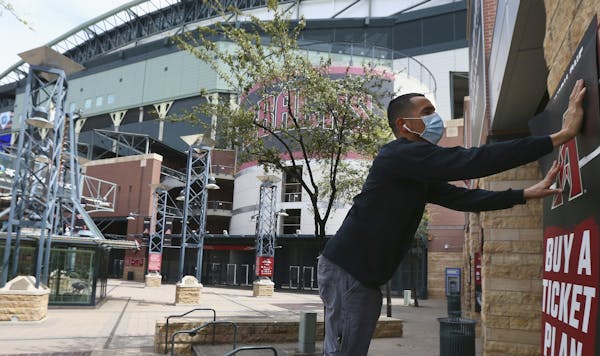The Twins were scheduled to play in Arizona for the first time since 2011 this July. Maybe they will after all.
Only 12 Twins games have been postponed by the coronavirus pandemic thus far, but it's clear the other 150 already are in serious jeopardy, which is why Major League Baseball and its players union are brainstorming some long-shot options for salvaging the 2020 season. Chief among them: Sequester all 30 teams in the Phoenix area, play as many games as possible in front of TV cameras but no fans, and avoid ditching an entire season while recouping at least a chunk of the sport's visibility, revenue and paychecks.
Outlines of such a plan were discussed Monday during a conference call between representatives of MLB and the players association, the Associated Press reported. In a statement issued Tuesday after word of the talks leaked, MLB acknowledged "considering" the idea but said "we have not settled on that option or developed a detailed plan."
The simple brick-and-mortar logistics of the idea make some sense. There are 10 spring training stadiums within a 50-mile radius in Arizona, Division I universities Grand Canyon and Arizona State play in upper-tier facilities, and Chase Field in downtown Phoenix is the domed home of the Arizona Diamondbacks.
And starting their season while other professional sports remain idled — opening abbreviated training camps as early as late May has been suggested — would give the sport a kick-start toward recouping some of the billions of television dollars lost to the pandemic.
But the notion also faces significant hurdles, starting with the support of the players. Their union has not yet polled its membership about the idea, and while players overwhelmingly are eager to play ball once it's safe, the necessity of keeping them isolated from the general public and perhaps their own families for several months might cause them to reject the plan.
Arizona is infected with the virus just like the rest of the U.S. — there were 2,456 confirmed cases of coronavirus in Arizona as of Tuesday, according to the Centers for Disease Control and Prevention, and 73 deaths, both numbers more than twice Minnesota's — so the plan calls for players to live in a semi-quarantine arrangement, limited mostly to ballparks and team hotels. Regular testing to identify and contain any outbreak among players and coaches would be necessary, something that is not yet available nationally. Carrying more than 26 players on the roster would be necessary in case of injury, especially since no minor leagues would be playing.
Maintaining and preparing fields, producing telecasts, umpiring games and tending to the normal medical requirements of each team would also require staffs of more than 250 people, further opening players and coaching staffs to the potential of infection. Even without fans, that's a significant number of people who presumably would need to be tested before coming into contact with players.
"Personally, I just don't see any situation where we can have 200 players and staff in a stadium and not have fans there," Twins reliever Taylor Rogers said last month, well before MLB began examining the Arizona plan. "That's just personal opinion. I do think people are open to it if that's what we can do to get the season going."
Another factor: The Twins are used to playing in extreme weather conditions each April, but this would be quite different. Daytime temperatures in Phoenix average 106 degrees in July and 105 in August, and remain in the mid-80s even at night. Playing regularly, and especially playing doubleheaders, would be difficult under those conditions.
MLB owners agreed to pay the players a pro-rated portion of their salaries if the season ever begins, but that deal was made with the supposition that games would be played in regular home stadiums, with fans in the stands. Without that revenue source, a new agreement would have to be reached about salaries, or many teams would merely be piling additional losses on top of their lost-season finances.
Pros to preps: Updates on sports leagues during the pandemic
Baseball will need the go-ahead from state and federal health officials in order to implement such a plan, though ESPN reported Monday that they have been encouraged by signals from officials in Washington. Still, the coronavirus is far from contained, and the situation could abruptly change.
Which is why MLB, though desperate to find a way to play some sort of 2020 season, is being cautious about committing to anything yet.
"While we continue to interact regularly with governmental and public health officials, we have not sought or received approval of any plan from federal, state and local officials, or the Players Association," the commissioner's office said in its statement. "The health and safety of our employees, players, fans and the public at large are paramount, and we are not ready at this time to endorse any particular format for staging games in light of the rapidly changing public health situation."
